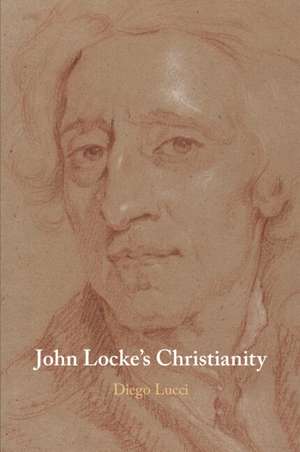John Locke's Christianity
Autor Diego Luccien Limba Engleză Paperback – 10 aug 2022
| Toate formatele și edițiile | Preț | Express |
|---|---|---|
| Paperback (1) | 221.56 lei 6-8 săpt. | |
| Cambridge University Press – 10 aug 2022 | 221.56 lei 6-8 săpt. | |
| Hardback (1) | 598.80 lei 6-8 săpt. | |
| Cambridge University Press – 7 oct 2020 | 598.80 lei 6-8 săpt. |
Preț: 221.56 lei
Nou
Puncte Express: 332
Preț estimativ în valută:
42.40€ • 44.21$ • 35.24£
42.40€ • 44.21$ • 35.24£
Carte tipărită la comandă
Livrare economică 21 martie-04 aprilie
Preluare comenzi: 021 569.72.76
Specificații
ISBN-13: 9781108819428
ISBN-10: 1108819427
Pagini: 252
Dimensiuni: 152 x 229 x 13 mm
Greutate: 0.35 kg
Editura: Cambridge University Press
Colecția Cambridge University Press
Locul publicării:Cambridge, United Kingdom
ISBN-10: 1108819427
Pagini: 252
Dimensiuni: 152 x 229 x 13 mm
Greutate: 0.35 kg
Editura: Cambridge University Press
Colecția Cambridge University Press
Locul publicării:Cambridge, United Kingdom
Cuprins
Introduction; 1. The context and background of Locke's biblical theology; 1.1 Rejecting antinomianism and deism; 1.2 Searching for the foundations of morality; 1.3 Reason, revelation, and morality; 2. Engaging with scripture and heterodoxy; 2.1 Socinianism and Arminianism; 2.2 Scriptural authority and historical method; 2.3 The way of fundamentals; 3. A scripture-based moralist soteriology; 3.1 Natural theology, biblical theology, and natural law theory; 3.2 Law of nature, law of Moses, law of faith; 3.3 Original sin, satisfaction, and atonement; 4. The soul and the Last Judgment; 4.1 Death and resurrection; 4.2 Personal identity and moral accountability; 4.3 Consciousness, repentance, and salvation; 5. The Trinity and Christ; 5.1 The Trinitarian controversy; 5.2 Locke's messianic and non-Trinitarian Christology; 5.3 The debate on Locke and the Trinity; 6. Religious toleration and Christian irenicism; 6.1 The theoretical framework of A Letter concerning Toleration; 6.2 Locke's omissions and exceptions to toleration in the letter and other writings; 6.3 Salvation and toleration in Locke's theological writings; Conclusion; Bibliography; Index.
Recenzii
'Lucci's book is the most up-to-date and comprehensive treatment of Locke's religious thought and writings. It is a masterly account that in many ways has mastered Locke.' Peter Anstey, University of Sydney
'Many books have asserted the importance for Locke of his Christian convictions. Now at last we have a comprehensive and authoritative reconstruction of Locke's theology. Embedded as deeply in the archive as in Locke's published works, Diego Lucci's book is a model of exposition and interpretation.' Mark Goldie, University of Cambridge
'After reading this book, one would no longer think of John Locke merely as a precursor of secular political theory or Enlightenment epistemology. Diego Lucci has convincingly demonstrated how Locke needs to be situated within the context of early modern English and European philosophical and theological debates surrounding the human self, divine saviour, and society.' Paul Lim, Vanderbilt University
'John Locke's Christianity is an impressive scholarly work that locates important historical and theological distinctions within 17th century Christianity and uses these distinctions, as well as Locke's own religious writings, to make a strong textual and contextual case that Locke's Christianity was both unique and sheds light on theological complexities inherent in epistemological, metaphysical, moral, and political aspects of his thinking. This remarkably detailed work occupies an otherwise unfilled and welcome place in Locke studies.' Shelley Weinberg, University of Illinois at Urbana-Champaign
'Through a careful study of the relevant publications and manuscripts, in this admirable book Diego Lucci both presents a reconstruction of John Locke's biblical Christianity and makes a compelling case for its importance to understanding his moral, philosophical and political thought. Lucci not only establishes the importance of theology to Locke, but demonstrates that it helped bind together his various intellectual endeavours.' Stephen Snobelen, University of King's College
'Lucci's conclusion is an incisive intellectual history of Lockean scholarship, especially regarding Locke's placement in the narrative of the origins and triumph of the secular Enlightenment … Recommended.' E. J. Eisenach, Choice
'Many books have asserted the importance for Locke of his Christian convictions. Now at last we have a comprehensive and authoritative reconstruction of Locke's theology. Embedded as deeply in the archive as in Locke's published works, Diego Lucci's book is a model of exposition and interpretation.' Mark Goldie, University of Cambridge
'After reading this book, one would no longer think of John Locke merely as a precursor of secular political theory or Enlightenment epistemology. Diego Lucci has convincingly demonstrated how Locke needs to be situated within the context of early modern English and European philosophical and theological debates surrounding the human self, divine saviour, and society.' Paul Lim, Vanderbilt University
'John Locke's Christianity is an impressive scholarly work that locates important historical and theological distinctions within 17th century Christianity and uses these distinctions, as well as Locke's own religious writings, to make a strong textual and contextual case that Locke's Christianity was both unique and sheds light on theological complexities inherent in epistemological, metaphysical, moral, and political aspects of his thinking. This remarkably detailed work occupies an otherwise unfilled and welcome place in Locke studies.' Shelley Weinberg, University of Illinois at Urbana-Champaign
'Through a careful study of the relevant publications and manuscripts, in this admirable book Diego Lucci both presents a reconstruction of John Locke's biblical Christianity and makes a compelling case for its importance to understanding his moral, philosophical and political thought. Lucci not only establishes the importance of theology to Locke, but demonstrates that it helped bind together his various intellectual endeavours.' Stephen Snobelen, University of King's College
'Lucci's conclusion is an incisive intellectual history of Lockean scholarship, especially regarding Locke's placement in the narrative of the origins and triumph of the secular Enlightenment … Recommended.' E. J. Eisenach, Choice
Notă biografică
Descriere
Provides a thorough analysis and reassessment of Locke's original, heterodox, internally coherent version of Protestant Christianity.
